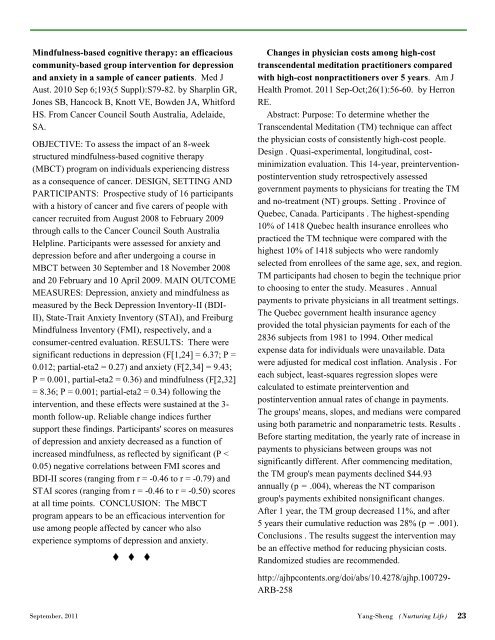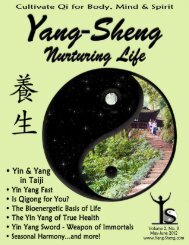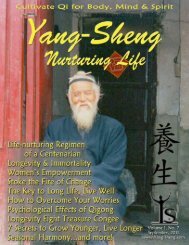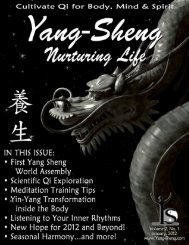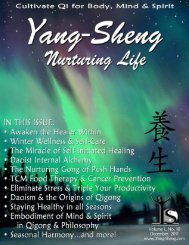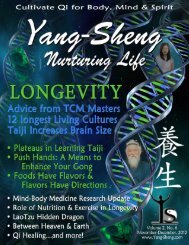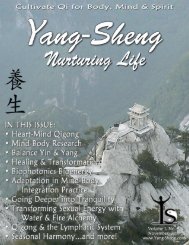Click to download the entire September issue as a PDF - Yang-Sheng
Click to download the entire September issue as a PDF - Yang-Sheng
Click to download the entire September issue as a PDF - Yang-Sheng
You also want an ePaper? Increase the reach of your titles
YUMPU automatically turns print PDFs into web optimized ePapers that Google loves.
Mindfulness-b<strong>as</strong>ed cognitive <strong>the</strong>rapy: an efficacious<br />
community-b<strong>as</strong>ed group intervention for depression<br />
and anxiety in a sample of cancer patients. Med J<br />
Aust. 2010 Sep 6;193(5 Suppl):S79-82. by Sharplin GR,<br />
Jones SB, Hancock B, Knott VE, Bowden JA, Whitford<br />
HS. From Cancer Council South Australia, Adelaide,<br />
SA.<br />
OBJECTIVE: To <strong>as</strong>sess <strong>the</strong> impact of an 8-week<br />
structured mindfulness-b<strong>as</strong>ed cognitive <strong>the</strong>rapy<br />
(MBCT) program on individuals experiencing distress<br />
<strong>as</strong> a consequence of cancer. DESIGN, SETTING AND<br />
PARTICIPANTS: Prospective study of 16 participants<br />
with a his<strong>to</strong>ry of cancer and five carers of people with<br />
cancer recruited from August 2008 <strong>to</strong> February 2009<br />
through calls <strong>to</strong> <strong>the</strong> Cancer Council South Australia<br />
Helpline. Participants were <strong>as</strong>sessed for anxiety and<br />
depression before and after undergoing a course in<br />
MBCT between 30 <strong>September</strong> and 18 November 2008<br />
and 20 February and 10 April 2009. MAIN OUTCOME<br />
MEASURES: Depression, anxiety and mindfulness <strong>as</strong><br />
me<strong>as</strong>ured by <strong>the</strong> Beck Depression Inven<strong>to</strong>ry-II (BDI-<br />
II), State-Trait Anxiety Inven<strong>to</strong>ry (STAI), and Freiburg<br />
Mindfulness Inven<strong>to</strong>ry (FMI), respectively, and a<br />
consumer-centred evaluation. RESULTS: There were<br />
significant reductions in depression (F[1,24] = 6.37; P =<br />
0.012; partial-eta2 = 0.27) and anxiety (F[2,34] = 9.43;<br />
P = 0.001, partial-eta2 = 0.36) and mindfulness (F[2,32]<br />
= 8.36; P = 0.001; partial-eta2 = 0.34) following <strong>the</strong><br />
intervention, and <strong>the</strong>se effects were sustained at <strong>the</strong> 3-<br />
month follow-up. Reliable change indices fur<strong>the</strong>r<br />
support <strong>the</strong>se findings. Participants' scores on me<strong>as</strong>ures<br />
of depression and anxiety decre<strong>as</strong>ed <strong>as</strong> a function of<br />
incre<strong>as</strong>ed mindfulness, <strong>as</strong> reflected by significant (P <<br />
0.05) negative correlations between FMI scores and<br />
BDI-II scores (ranging from r = -0.46 <strong>to</strong> r = -0.79) and<br />
STAI scores (ranging from r = -0.46 <strong>to</strong> r = -0.50) scores<br />
at all time points. CONCLUSION: The MBCT<br />
program appears <strong>to</strong> be an efficacious intervention for<br />
use among people affected by cancer who also<br />
experience symp<strong>to</strong>ms of depression and anxiety.<br />
<br />
<br />
Changes in physician costs among high-cost<br />
transcendental meditation practitioners compared<br />
with high-cost nonpractitioners over 5 years. Am J<br />
Health Promot. 2011 Sep-Oct;26(1):56-60. by Herron<br />
RE.<br />
Abstract: Purpose: To determine whe<strong>the</strong>r <strong>the</strong><br />
Transcendental Meditation (TM) technique can affect<br />
<strong>the</strong> physician costs of consistently high-cost people.<br />
Design . Qu<strong>as</strong>i-experimental, longitudinal, costminimization<br />
evaluation. This 14-year, preinterventionpostintervention<br />
study retrospectively <strong>as</strong>sessed<br />
government payments <strong>to</strong> physicians for treating <strong>the</strong> TM<br />
and no-treatment (NT) groups. Setting . Province of<br />
Quebec, Canada. Participants . The highest-spending<br />
10% of 1418 Quebec health insurance enrollees who<br />
practiced <strong>the</strong> TM technique were compared with <strong>the</strong><br />
highest 10% of 1418 subjects who were randomly<br />
selected from enrollees of <strong>the</strong> same age, sex, and region.<br />
TM participants had chosen <strong>to</strong> begin <strong>the</strong> technique prior<br />
<strong>to</strong> choosing <strong>to</strong> enter <strong>the</strong> study. Me<strong>as</strong>ures . Annual<br />
payments <strong>to</strong> private physicians in all treatment settings.<br />
The Quebec government health insurance agency<br />
provided <strong>the</strong> <strong>to</strong>tal physician payments for each of <strong>the</strong><br />
2836 subjects from 1981 <strong>to</strong> 1994. O<strong>the</strong>r medical<br />
expense data for individuals were unavailable. Data<br />
were adjusted for medical cost inflation. Analysis . For<br />
each subject, le<strong>as</strong>t-squares regression slopes were<br />
calculated <strong>to</strong> estimate preintervention and<br />
postintervention annual rates of change in payments.<br />
The groups' means, slopes, and medians were compared<br />
using both parametric and nonparametric tests. Results .<br />
Before starting meditation, <strong>the</strong> yearly rate of incre<strong>as</strong>e in<br />
payments <strong>to</strong> physicians between groups w<strong>as</strong> not<br />
significantly different. After commencing meditation,<br />
<strong>the</strong> TM group's mean payments declined $44.93<br />
annually (p = .004), where<strong>as</strong> <strong>the</strong> NT comparison<br />
group's payments exhibited nonsignificant changes.<br />
After 1 year, <strong>the</strong> TM group decre<strong>as</strong>ed 11%, and after<br />
5 years <strong>the</strong>ir cumulative reduction w<strong>as</strong> 28% (p = .001).<br />
Conclusions . The results suggest <strong>the</strong> intervention may<br />
be an effective method for reducing physician costs.<br />
Randomized studies are recommended.<br />
http://ajhpcontents.org/doi/abs/10.4278/ajhp.100729-<br />
ARB-258<br />
<strong>September</strong>, 2011 <strong>Yang</strong>-<strong>Sheng</strong> (Nurturing Life) 23


